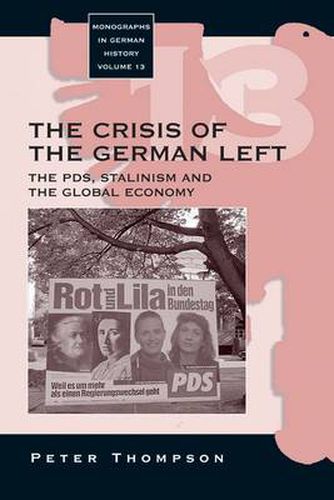Readings Newsletter
Become a Readings Member to make your shopping experience even easier.
Sign in or sign up for free!
You’re not far away from qualifying for FREE standard shipping within Australia
You’ve qualified for FREE standard shipping within Australia
The cart is loading…






Using Nietzsche’s categories of monumentalist, antiquarian and critical history, the author examines the historical and theoretical contexts of the collapse of the GDR in 1989 and looks at the positive and negative legacies of the GDR for the PDS (the successor party to the East German Communists). He contends that the Stalinization of the GDR itself was the product not just of the Cold War but of a longer inter-systemic struggle between the competing primacies of politics and economics and that the end of the GDR has to be seen as a consequence of the global collapse of the social imperative under the pressure of the re-emergence of the market-state since the mid-1970s. The PDS is therefore stuck in dilemma in which any attempt to arrive in the Federal Republic (Brie) is criticized as a readiness to accept the dominance of the market over society whereas any attempt to prioritize social imperatives over the market is attacked as a form of unreconstructed Stalinism. The book offers some suggestions as to how to escape from this dilemma by returning to the critical rather than monumentalist and antiquarian traditions of the workers’ movement.
$9.00 standard shipping within Australia
FREE standard shipping within Australia for orders over $100.00
Express & International shipping calculated at checkout
Using Nietzsche’s categories of monumentalist, antiquarian and critical history, the author examines the historical and theoretical contexts of the collapse of the GDR in 1989 and looks at the positive and negative legacies of the GDR for the PDS (the successor party to the East German Communists). He contends that the Stalinization of the GDR itself was the product not just of the Cold War but of a longer inter-systemic struggle between the competing primacies of politics and economics and that the end of the GDR has to be seen as a consequence of the global collapse of the social imperative under the pressure of the re-emergence of the market-state since the mid-1970s. The PDS is therefore stuck in dilemma in which any attempt to arrive in the Federal Republic (Brie) is criticized as a readiness to accept the dominance of the market over society whereas any attempt to prioritize social imperatives over the market is attacked as a form of unreconstructed Stalinism. The book offers some suggestions as to how to escape from this dilemma by returning to the critical rather than monumentalist and antiquarian traditions of the workers’ movement.